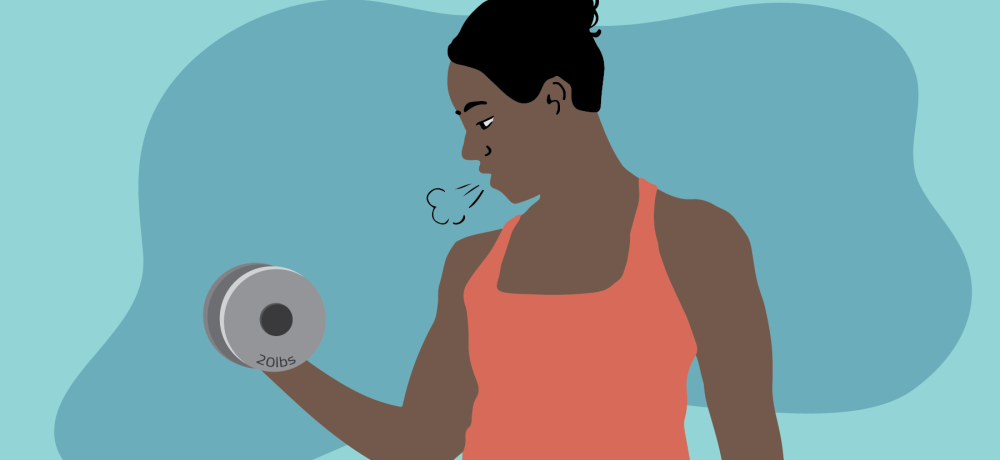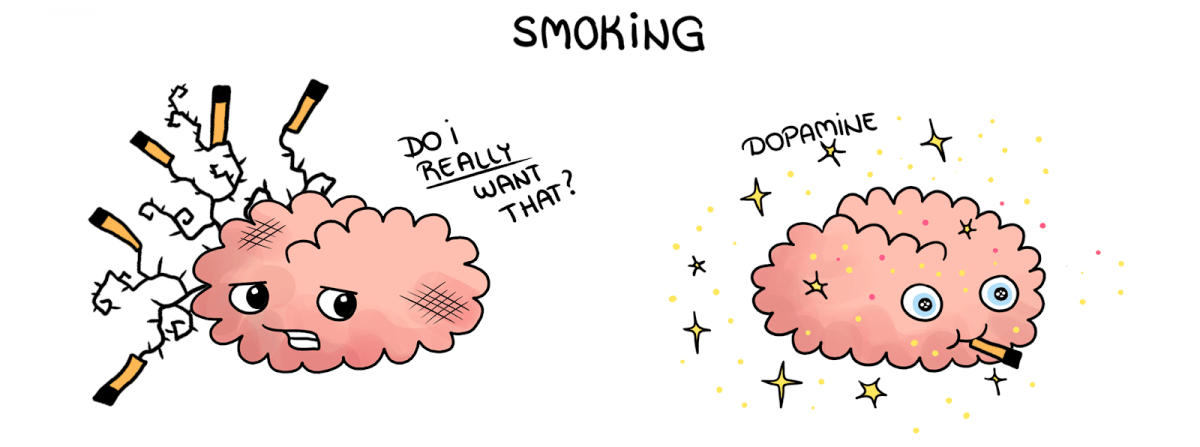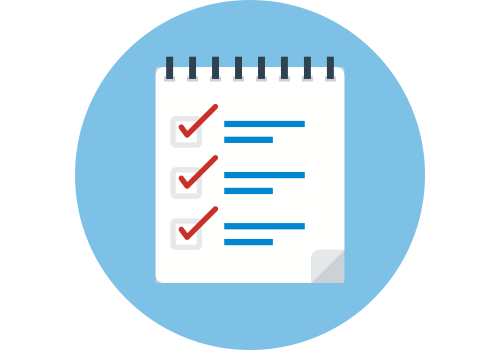
Staying Healthy at Home During Quarantine: Behavioral Tips
Despite all the uncertainty surrounding the COVID-19 pandemic, one thing is for sure; we spend way more time at home than we did before. We sit down and look at our computers to work, shop, and for many other occasions that we would have normally left home for. In many ways, the transition to remote life has unleashed exposure to some unhealthy habits and also disrupted our prior healthy routines. Staying healthy at home during quarantine got difficult due to various reasons, including the ones that we are not even aware of; cognitive biases.
For example, working out at home got more challenging for a lot of people, perhaps due to limited space or feelings of procrastination. According to a survey from a protein powder company called Naked Nutrition, two-third of the prior routine exercise lovers gave up on their exercising habits during the Covid-19 quarantine. 65% of them who gave up on routine exercising indeed reported the need to let themselves go during this stressful period.

The ‘new normal’ conditions makes it important to be aware of some of the cognitive biases, which are the systematic errors in our thinking and decision-making, would be of help to create healthier habits at home. This way, we can encourage or discourage ourselves from engaging in particular behaviors. Let’s explore three of these biases that may affect our struggle to get through those daily crunches.
Three Cognitive Biases to be Aware of at Home
1. Optimism Bias: Our Personal Fables
Optimism bias, also known as the illusion of invulnerability, is a misbelief that tricks us into thinking that “we are less likely to experience negative consequences and more likely to experience positive outcomes compared to others”. With this overly sunny outlook, we make poor decisions and engage in risky behavior. In medicine, optimism bias is associated with increased susceptibility towards diseases, since it tends to be an obstacle to our approach to taking preventative measures. Accordingly, optimism bias is also a barrier when we try to stay healthy at home.
Think about this scenario…
We might feel healthy and have no physical problems at the time. This is perfect! However, because of this optimistic view about our health, we think it is unlikely that we will face health issues, especially due to having a bad diet and an inactive lifestyle. Consecutively, we also assume that regular exercise is unnecessary, and there is no urgent need to engage in a healthy diet.
Due to this optimistic thinking, we often end up rather choosing to watch TV while eating a bowl of crisps instead of exercising in our free time. At the end of the day, turning the TV on does not require much effort, and it is more fun anyway… So, why not?
Yet, we often neglect that exercising and getting the right amount of nutrients do not treat current health issues per se. Instead, they constitute a healthier lifestyle choice for your future, making you much less likely to have negative outcomes in the long-run. Thus, the real question is: What can we do to overcome optimism bias and get ourselves to be more healthy at home?
Ways to Avoid Optimism Bias
Foremost, take an outsider’s perspective and, by this way, increase awareness to the risk factors and consequences of engaging in certain habits. This would help us to see the issue from a more realistic perspective. Let’s get back to the example of exercising at home. For this matter, a thing to consider perhaps is researching the benefits of regular exercise and the consequences of not having a physically active lifestyle.
For example, you can try to get inspired by people who care about their fitness and diet. You can even try to approach them about their exercising habits asking what helps them to stay motivated and on top of their health during quarantine. As well as getting inspired, you might also want to reevaluate some example figures from your social circle who experience problems related to their bodily health. Identification of such figures would help you to realize how common in reality it is to be impacted by an unhealthy lifestyle – the proof is in the pudding!
2. Cognitive Dissonance: Inconsistencies in Our Minds
Cognitive dissonance refers to the experiences in which the concurrent conflicting attitudes, beliefs, and behaviors clash and lead to mental discomfort. In simpler words, what we believe and what we do sometimes do not match and cause a clash. We also commonly encounter this state during our life at home.
Take a Moment to Remember…
Do you remember the times when you chose the unhealthy option and ignored the healthier alternative although you were fully aware of its negative consequences? If you have not yet come up with one, I have a very relatable one for you. Imagine you are on a diet in which the sugary products are restricted. Let’s say, you see a delicious chocolate cake in a TV advertisement. At that moment, although you know that eating a piece of cake would be against your dietary intentions, you still think: Let’s bake one and eat a piece after dinner. This is exactly when this clash between your belief and action occurs.
To solve this conflict, you eventually make eating this cake more acceptable by convincing yourself that you will skip lunch. This example shows that it is not always easy to stick to the desired behavior. One way to go about this could be by trying to focus on how hard you tried to achieve your goal. You could perhaps try to make use of another cognitive bias called the sunk cost fallacy. You can do this by reminding yourself how much time and consideration you put into achieving this aim of, in this case, losing weight. This would keep you motivated.
Another Example: Smoking
Another well-known example comes from our engagement in unhealthy habits like smoking. I can imagine that smoking is probably a coping strategy for a lot of people during stressful times like a pandemic. On that note, if you have experienced increased smoking during quarantine at home, you are not alone. A recent study found that individuals smoked relatively more cigarettes during the lockdown and the leading motive for this behavior was boredom, lack of daily life structure, and exposure to stress-inducing conditions.
As seen, one might start smoking when feeling worried and stressed despite being well-aware of its long-term unhealthy aspects. For the habit of smoking, we tend to convince ourselves that smoking makes us feel better, and we aim to stop smoking after we are over our stress. This is a very common example of cognitive dissonance since we engage in such thinking to avoid the conflict between knowing what is healthy and what we do in reality.
3. Distance Bias: Out of Sight Out of Mind
Distance bias is another cognitive bias that describes our tendency to prioritize what is nearby to us over what is far, whether in physical space, time, or in other domains. I believe many of us know the saying “out of sight out of mind’, and can relate this to work-related deadlines during the times of remote work. In the context of staying healthy at home, distance bias is possibly one of the sources of our work-related stress, mostly due to procrastination.
The way we approach our work has changed a lot since we shifted to work remotely. For example, it is a common experience among many of us that although we know our deadlines are approaching, we still place the idea of working on these deadlines on the back burner. The main reason for this is that we either get distracted at home or demotivated about the work that we need to do since it does not feel as important as it felt before.
In other words, the idea of work stays distant in our minds considering that we are also away from the environment that we associate work with. Eventually, we leave work at the last minute and, of course, stress out. As this behavior turns into a habit, the stressful feeling gets more persistent. It is obviously not good for our health, especially for our mental health during these already stressful times. So, how can we avoid this bias from affecting our mental health at home?
Avoiding Distance Bias
For this problem, my first recommendation would be to create a daily or weekly to-do list. While making this list, it is of importance to prioritize what actually is more crucial to do. This would make you feel less stressed at the end of the day. Would you rather get on top of your deadlines or watch TV for excessive amounts of time? Personally, watching my favorite TV show feels more enjoyable once I finish my work on time and get it out of the way.
Secondly, you can arrange weekly meetings with your close colleagues and/or classmates to go over the tasks that need to be done. During these meetings, you can show what you have done so far. These meetings would encourage you to perform better and help you to keep your motivation up.
Some Final Words…
During these unforeseen times, it became even more important to try our best to make the new normal conditions as bearable as possible for our physical and mental health. Thus, I referred to the role of cognitive biases and mentioned the importance of being aware of their presence when we try staying healthy at home.
If you want to learn more about behavioral insights, read our blog or watch 100+ videos on our YouTube channel!
About Neurofied
Neurofied is a behavioral science company specialized in training, consulting, and change management. We help organizations drive evidence-based and human-centric change with insights and interventions from behavioral psychology and neuroscience. Consider us your behavioral business partner who helps you build behavioral change capabilities internally.
Since 2018, we have trained thousands of professionals and worked with over 100 management, HR, growth, and innovation teams of organizations such as Johnson & Johnson, KPMG, Deloitte, Novo Nordisk, ABN AMRO, and the Dutch government. We are also frequent speakers at universities and conferences.
Our mission is to democratize the value of behavioral science for teams and organizations. If you see any opportunities to collaborate, please contact us here.



